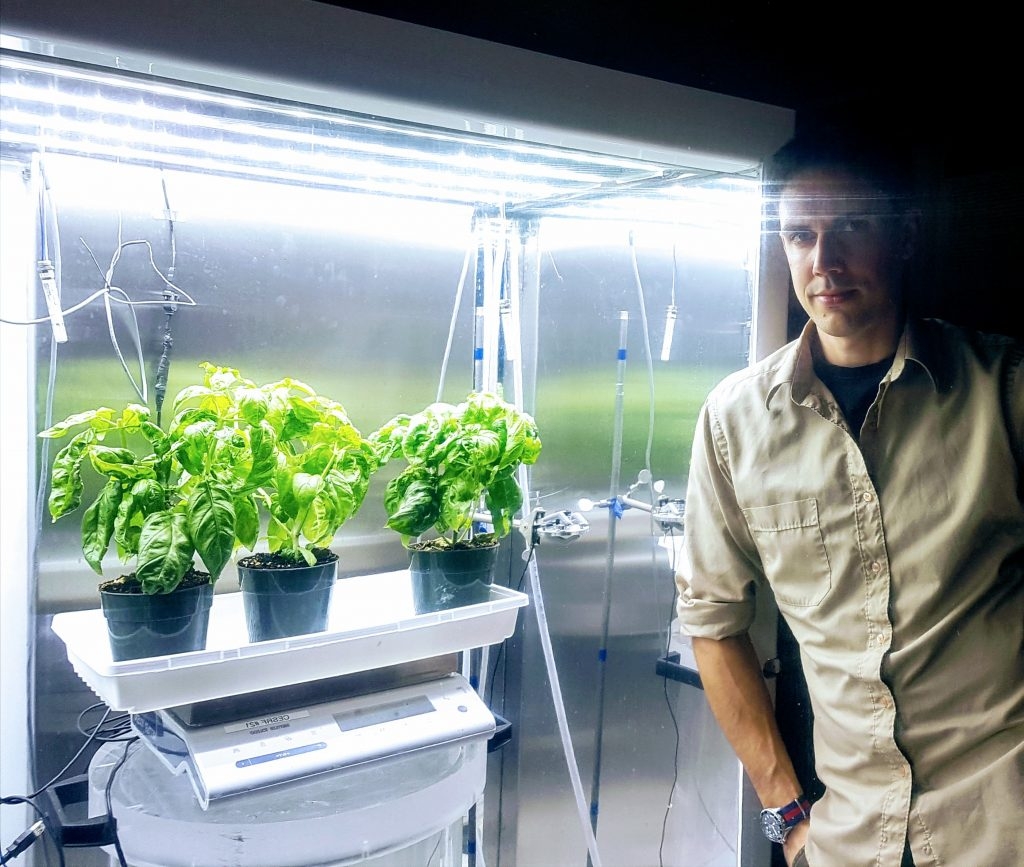
Nov. 29, 2017, Guelph, Ont. – It’s an unremarkable building from the outside, tucked away on a side street on the University of Guelph campus. What’s inside, though, is most remarkable – and may well be lighting the way for future human life in space, as well as better life here on earth.
Not only are researchers in the Controlled Environment Systems Research Facility working on how to best grow food away from Earth, they’re also experimenting with using light to improve the production of medical marijuana and cancer-fighting tobacco plants, helping nurseries reduce water and fertilizer use on their trees and shrubs, and finding low cost solutions to growing more compact bedding plants.
PhD candidate Dave Hawley (pictured) is using basil and strawberry plants in experiments designed to find the best LED light combination for use in small, low atmosphere growth chambers that will not only simulate but actually improve upon real sunlight – and resulting in better flavour and ultimately helping feed people on long space journeys
.
“We can actually do a lot better than sunlight. Every part of the spectrum of sunlight costs energy and money, but if we can isolate only the parts that provide the most benefit to plant growing, this can be a very efficient process,” explains Hawley, adding the technology would also be excellent for growing food underground or in the far North where fresh produce is expensive and not always of good quality.
His ultimate goal, though, is to apply his learnings from these crops to medical marijuana. According to Hawley, it’s an industry that is in its infancy when it comes to growing plants consistent in both appearance and the medicinal compounds they contain. Clinical studies involving medicinal cannabis, for example, need a steady of supply of consistent drugs, he says.
LED LIGHT RESEARCH
Masters’ student Sean Ratcliffe is working on a project for University of Guelph spin-off Plant Form, a company best known for its tobacco plant-derived cancer drug and Ebola vaccine. He’s trying to determine which growing media or substrates and which LED light combination will provide the best tobacco plants with the qualities Plant Form scientists need to make their innovative breast cancer drug.
COMPACT GREENHOUSE FLOWER CROPS
Another Masters’ student, Jasmin Mah, is working on a low-cost solution for flower growers looking to grow more compact bedding plants in floral greenhouses. Currently, growers use growth regulators to make plants more compact; Mah’s work is evaluating the impact of end of day lighting on how plants grow, switching to different light treatments daily at 11 p.m.
IRRIGATION APP RESEARCH
An app developed by Masters’ student Jared Stoochnoff uses on-site weather data to predict how much irrigation water ornamental trees and shrubs will need. During commercial trials, automated irrigation controlled by Stoochnoff’s app reduced water consumption by 50 per cent compared to conventional irrigation schedules – without impacting plant productivity or quality. More efficient water use helps minimize nutrient run off, reduce fertilizer needs, and lessen the environmental footprint of ornamental nurseries.
The app is based on previous research by Stoochnoff’s advisor Prof. Mike Dixon, director of the Controlled Environment Systems Research Facility and program.
Lilian Schaer is the editor with AgInnovation Ontario. AgInnovation Ontario is a project of the Agri-Technology Commercialization Centre (ATCC). The ATCC is funded by Growing Forward 2, a federal-provincial-territorial initiative.
Print this page
